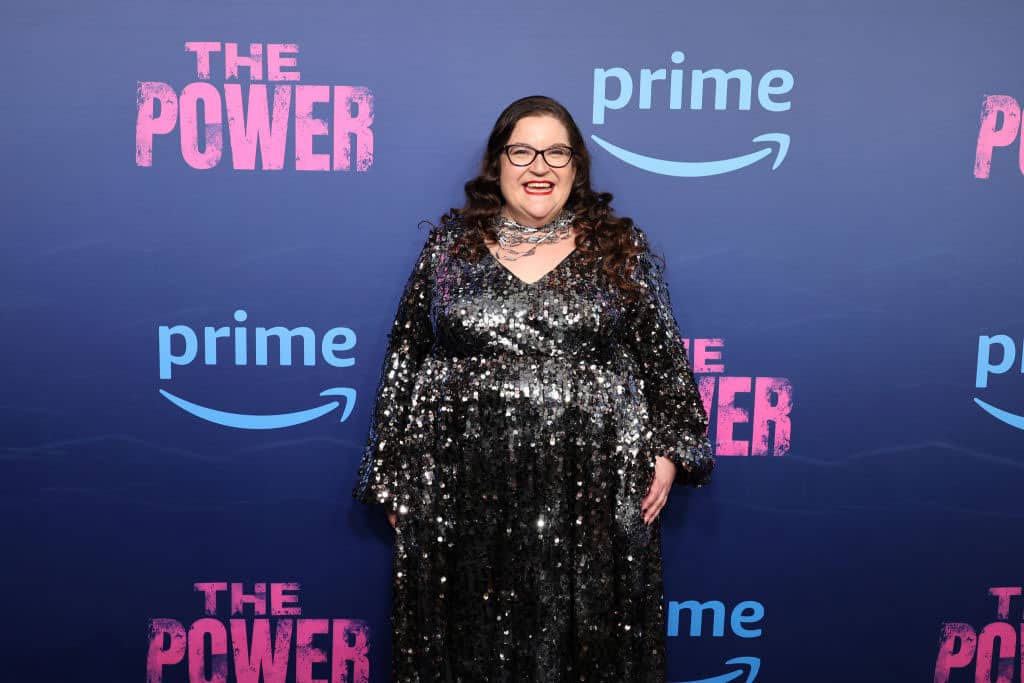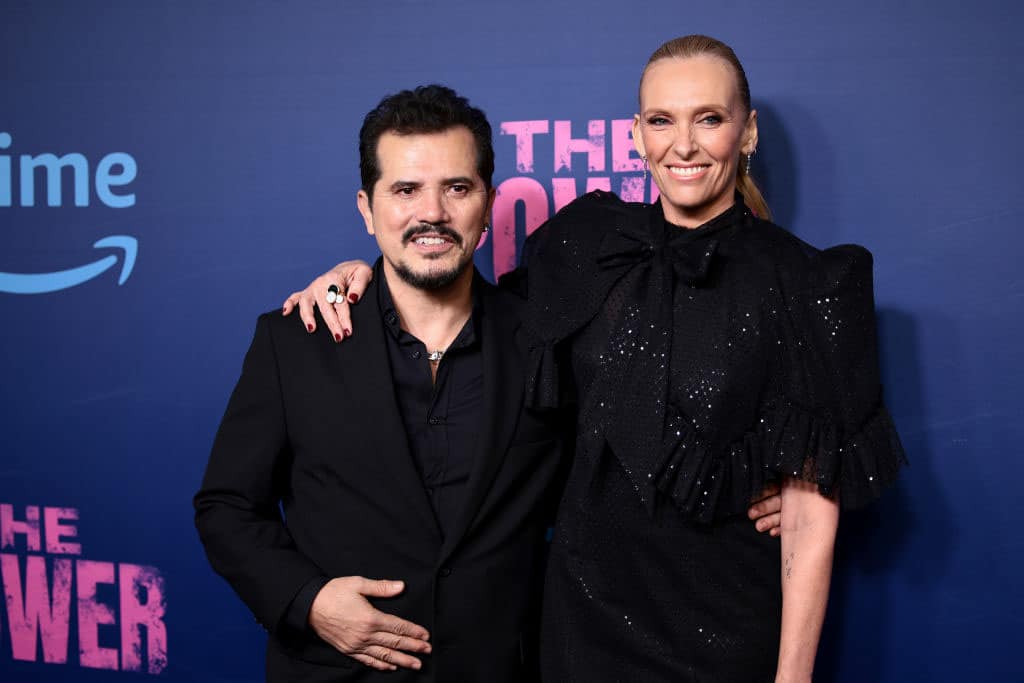 Naomi Alderman attends “The Power” New York Red Carpet Premiere and Screening on March 23, 2023 in New York City. (Photo by Cindy Ord/Getty Images for Prime Video)
Naomi Alderman attends “The Power” New York Red Carpet Premiere and Screening on March 23, 2023 in New York City. (Photo by Cindy Ord/Getty Images for Prime Video) Imagine a world where women gain the ability to generate electricity through their bodies like electric eels. Naomi Alderman boldly details such an extraordinary transformation in her award-winning science-fiction novel, “The Power.” Originally published in 2016, “The Power” was selected by former president Barack Obama as one of his favorite books the following year. The provocative bestseller was adapted into an electrifying Amazon Prime Video series starring Toni Collette and John Leguizamo.

It is no surprise Alderman’s favorite character is Roxy Monke (played by Ria Zmitrowicz), the sharp-tongued illegitimate daughter of a Jewish businessman.
“I really do love Roxy,” admitted the British author. “She’s the person who sat next to me in my imagination all the years that I sat behind a mechitza or in a ladies’ gallery. Yeah, she sat next to me punching holes in the furniture in my imagination. She is my rage.”
Alderman spoke with The Jewish Journal about religious influence on writing, the inspiration behind the feminist novel, and being mentored by none other than Margaret Atwood.
JJ: Roxy’s Jewish faith is really highlighted in the TV series.
NA: Her dad is Jewish in the book and the more we thought about it, obviously, that is the world that I come from. She’s in a really fascinating situation. Actually, of the four kids that her dad has, she’s the one most like her father. And she’s a girl, they’re boys. They’re supposed to be the heirs and she’s supposed to be the sort of afterthought. And yet, there she is. She’s very like him. It’s a real kind of richness.
I hope this is true. I think these days, viewers are more open to specificity and exactness—detail in the backgrounds of characters that you see on screen. You don’t expect everybody to kind of pretend that we’re all basically white in the same way and all backgrounds are the same. I think there’s a real interest in those sort of specific details. I thought, “Well, if I’m writing all these characters, I’m going to put a Jew in.”
JJ: How has your own Jewish upbringing influenced writing “The Power?”
NA: Well, I grew up really quite frum, which I would say left me with some—am I okay to say, “anger” about the position of women in traditional Orthodox Judaism and a real feeling of, you know, they know better. They know better and what’s sort of what’s hilarious is that it seems pretty obvious to everybody—that, in fact, Jewish culture is very based on education and what you know. For all that we can argue about like whether men are better than women at different kinds of specifically defined sporting activities, clearly women are as clever as men. That seems to have been proven quite well in the past hundred years since we started educating women properly. So, I guess, that feeling of like, “Guys, guys, we all know better than this now.” There is no reason not to have frum female rabbis. There’s literally no reason. You know, if we’re talking about understanding the material properly, it makes [the rabbis she grew up with] look a bit silly at this point.
I could talk about Jewish values all day. There’s a Jewish value of justice.
I could talk about Jewish values all day. There’s a Jewish value of justice. That’s a key value and that’s in there as well. I consider myself to be a very values-driven political writer. I’m interested in pointing out where there are things going on in the world that I think we all sort of secretly know we don’t agree with but decided that we don’t think about it too hard. That feels like one of the imperatives of Jewish justice, is to go, “No, we got to think about this.”
JJ: What was your original inspiration for writing “The Power?”
NA: I had a terrible breakup. That’s how all women become feminists—that’s a joke! That’s a joke. I had a terrible breakup where I was weeping every morning before I went off to work. At that point, when I was in that state, I got onto a subway train in London and there was a poster depicting a beautiful woman crying. Very artistically, it was one tear, advertising a movie. And something just snapped in my soul. It felt like the world telling me, “Oh, good, we like it when you cry.” And I just thought, “What would have to be different in the world for me to get into a tube train every now and then and see a photo of a handsome man crying?”
The question of the book is, “Why is it that it’s always patriarchy and so rarely matriarchy?” How do we get into this situation? My hypothesis is that a lot of it is about physical strength. I thought about women with enormous muscles, but that creates a very comedic mental image. I settled on electric eels because they really exist in the world. They are one of the crazy facts about the planet we evolved on, that this exists. Then, I had something real to research. The more I wrote it, the more I just really wanted it. That’s the problem.
JJ: What was the most difficult part of the adaptation process?
NA: I would have to say that was the global pandemic. We were the show that started shooting in February 2020. You don’t want to be that show. All the actors know their characters inside out. All the sets are built. Then, you have to take it all down for eighteen months and then start again. That was bad. Just in terms of technical writing stuff, I wrote a book that has four, maybe five, main characters whose stories don’t intersect until about halfway through the book. I think the team working on it have done an incredible job. I think it all looks fantastic.
JJ: What were your most favorite scenes to shoot?
NA: I really do like the riots in Saudi Arabia. Oh, I just got a shiver down my spine even thinking about it. Can you imagine trying to do that? That was shot with pandemic restrictions. The director of the episode, Lisa Gunning, just did an incredible job. And you believe it and you feel like you’re there amongst a huge riot. To see that all come to pass. Also, that is a part of the book that makes me cry every time I read it. Sorry, I do sometimes cry while reading my own work. I guess, I cried when I wrote it, so that’s okay. Seeing that all come to life.
You know, the thing about writing this book and living inside it is that you start to feel a little bit disappointed that the world is not like that when you come out. I haven’t been actually able to give this [power] to women who are living in oppression all around the world. But just for a little while, when seeing that shot, you feel like, “Okay, it’s real! It’s really happening!”
JJ: Why do you think it’s important that most of the TV series’ writers and producers are women?
NA: We don’t go looking for women. We just wanted the best people for the job. There were amazing men who worked on the project. There’s the producer Tim Bricknell who ended up directing some of it because one of the directors was not able to be there. There are such things as wonderful male allies—that does exist.
JJ: You serve as an Executive Producer and Writer on the series. Have you considered directing?
NA: I have. I think significantly smaller than this show would be a good place to start. I’m afraid my ambition knows no limits.
JJ: What’s it like to be mentored by Margaret Atwood?
NA: It’s excellent and, also, quite frightening. Do you know what? I love her. I think she’s wonderful. She and her late husband, Graeme Gibson, really took me into their home. Literally, I stayed in their house. They took me on trips around the world. We went to the Arctic together. She said, “Come to the Arctic, Naomi. It will change you.” I can give you the advice that Margaret would give any woman writer, that is, “Learn to say ‘no’ more. Don’t let people take up your time and your life energy. Save it for your own work.” She has impressed that upon me. I’ve taken it in, and I live by it.
This interview has been edited and condensed for clarity.






















 More news and opinions than at a Shabbat dinner, right in your inbox.
More news and opinions than at a Shabbat dinner, right in your inbox.